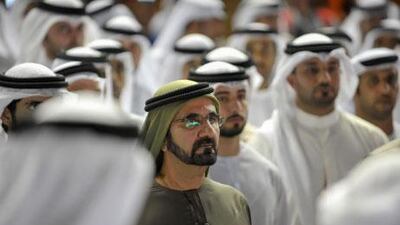DUBAI // Political leaders in the Middle East are increasingly using Twitter to engage the public, a new study suggests.
The Twiplomacy study, released today by public relations consultancy Burson-Marsteller, assessed 264 Twitter accounts belonging to heads of state from 125 countries, of which 21 were from the Mena region. The accounts had a combined following of 51,990,656 people from around the world.
"What we see from this study is that leaders within the Middle East, and the Gulf in particular, are some of the most engaged from around the world on Twitter," said Taufiq Rahim, a political analyst and graduate of Harvard's Kennedy School of Government who lives in Dubai.
While two-thirds of world leaders have a Twitter account, only 45 per cent of the accounts analysed for the Twiplomacy report were personal accounts of heads of state, just 30 world leaders update their own tweets and even fewer do so on a regular basis.
Meanwhile, many of the figures tweeting in the region were found to be engaging personally with the platform and using it to connect with upwardly mobile youth, said Mr Rahim.
Lebanese prime minister Najib Mikati is the most engaging among Arab leaders, the study showed. One-fifth of his tweets are replies and he regularly has one-hour long Twitter chats with his 54,782 followers.
UAE Foreign Minister Abdullah bin Zayed was another good example of an engaged Twitter leader, said Mr Rahim. "He tweets almost exclusively and regularly in Arabic, demonstrating a desire to connect with local audiences."
According to the Dubai School of Government's recent Arab Social Media Report, the Arab region has close to 2.1 million active Twitter users tweeting almost 4,000 tweets a minute. The top five Arab countries in terms of Twitter users are: Egypt, Saudi Arabia, Kuwait, UAE and Lebanon.
"What these Twitter accounts have enabled young people to do in the Arab world is vent their frustrations directly to politicians, dignitaries and other leaders in a public space for the first time," said Mr Rahim.
"This was notable during the Bahrain crisis, and during other times of regional tension in the past year."
Last month, Dubai's police chief Lt Gen Dahi Khalfan Tamim - a prominent Twitter user himself - warned against attempting to shake the security and stability of the GCC region through Twitter.
In March, the chief had publicly claimed Islamist extremists were posting messages on Facebook and Twitter "for political reasons and to create instability".
He warned the GCC would come together to ward off any breach on their security.
"It must still be noted that given that societies in the GCC are not fully open, there are restrictions on speech in the public domain and thus those tweeting still run the risk of breaking the law in any given country, depending on what they write," said Mr Rahim.
Among the Middle Eastern accounts assessed in the Twiplomacy study was that of Sheikh Mohammed bin Rashid, vice president and ruler of Dubai, who has just crossed the one million mark in followers.
His account is followed by 13 other world leaders, making him the most followed by leaders in the region.
The study also named Queen Rania Al Abdullah of Jordan the most popular in the region.
With 2,222,872 followers, she is the fourth most-followed leader in the world after Barack Obama, Hugo Chávez and the White House account.
Other regional leaders on Twitter include the recently-elected Tunisian president Moncef Marzouki, Palestinian prime minister Dr Salam Fayyad, Tunisian prime minister Hamadi Jebaliand and Nouri Al Maliki, the Iraqi prime minister.

